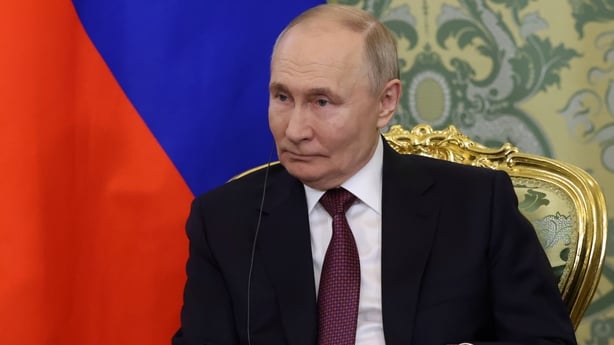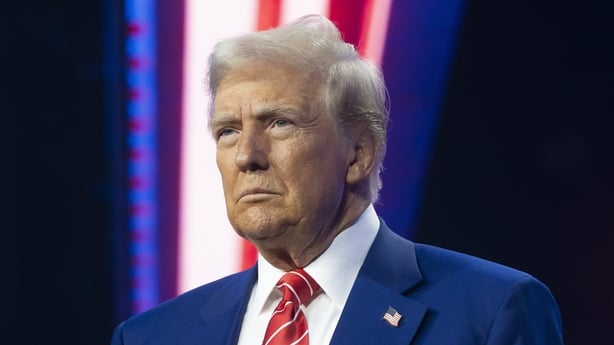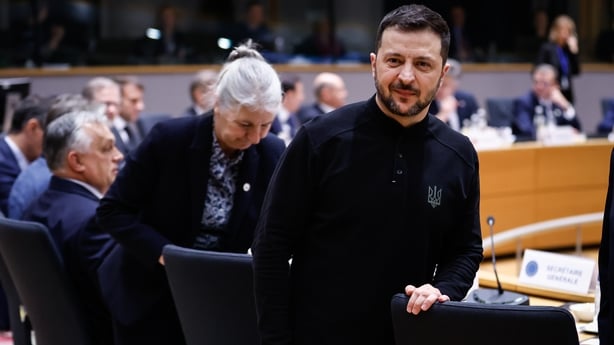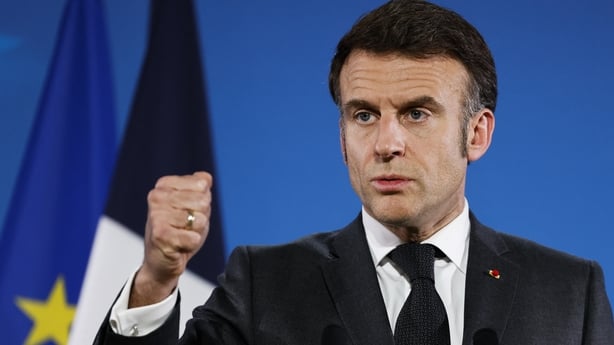Polish Prime Minister Donald Tusk has a habit of delivering alarming comments at big events.
At the start of Thursday's special EU Council summit in Brussels on Thursday, he called it as it is: that Europe is in an arms race with Russia.
"The arms race started by Russia, by Putin's Russia, all this means that Europe must be more self-efficient, independent," he said, adding that Europe needed to win the race.
Increasing defence expenditure was, he said, the "only method to avoid a conflict on a larger scale".
EU leaders came to Brussels for the special summit to discuss the European Commission's 'ReArm Europe’ proposal to mobilise €800bn for defence spending over the next four years.

And to discuss the bloc’s collective support for Ukraine.
Europe, Commission President Ursula von der Leyen said, was facing a "watershed moment".
It is a clichéd phrase but Ms von der Leyen had a point.
Europe is facing an existential crisis about whether it can defend itself.
Moves by the new Trump administration in the past few weeks to unilaterally engage Russia to end the war in Ukraine has left the future of the transatlantic partnership in jeopardy.
Thursday’s summit and the political decisions taken by EU leaders to move ahead with the Commission’s proposals on defence spending was a major step towards addressing the current gaps in the continent's defensive capabilities.
After more than ten hours of talks, the 27 leaders’ joint statement agreed to "bolster the security of the European Union and the protection of our citizens".

The EU, it stated, "will reinforce its overall defence readiness" and "reduce its strategic dependencies".
That kind of language will go down well with the US administration given its calls for European NATO members – which includes most EU member states – to spend more on their national defence budgets.
Agreement was reached on strengthening Europe’s defence industry by pooling member states' resources so that much needed equipment could be supplied more quickly. More joined up thinking essentially.
Currently, the pace of procurement is slow and European countries often compete to buy weaponry for their national armed forces.
Or they buy military equipment and ammunition from the US, meaning sizeable portions of defence budgets are not spent in Europe.
The joint statement also called on the Board of Governors of the European Investment Bank (EIB) to "urgently continue to adapt" its lending practices to the defence industry.
Currently, the EIB, the bloc’s lending arm, can only lend up to €2bn annually for defence projects.
That now looks set to change given that the Commission’s 'ReArm Europe’ plan proposes to raise €150bn in private capital on the markets for defence investments - those loans would be backed by the EU budget.
The other matter on the agenda was EU support for Ukraine.
Despite the handshakes, smiles and warm embrace that Ukrainian President Volodymyr Zelensky received in front of the cameras, the joint statement issued by the leaders of 26 member states did not deliver a new aid package for Ukraine.

Hungary opposed the joint statement on Ukraine, most likely because the text referenced the EU’s commitment to provide "military support" for Ukraine.
The text also welcomed the "readiness" of member states to "urgently step up efforts to address Ukraine’s pressing military and defence needs, in particular the delivery of air defence systems, ammunition and missiles".
This appeared to be a clear response from the EU to this week's decisions by the US administration to pause military aid deliveries and the sharing of intelligence with Kyiv.
Hungarian Prime Minister Viktor Orbán was never going to be onboard with any reference to supplying Kyiv with military equipment, a policy of opposition that his government has pursued since the start of Russia’s full-scale invasion.
A keen ally of Mr Trump, the Hungarian leader and his government back the Trump administration’s approach to ending the war.
However, there is still a lot that Ukraine can take from the joint statement of support.
Namely, that it reiterates the European Council’s position of "no negotiations on Ukraine without Ukraine" – a much-used mantra by European leaders in recent weeks.
The 26 leaders also stated the need for any truce to be backed by a robust security guarantee for Ukraine.
Overall, the 27 leaders gave the proposals, laid out in the 'ReArm Europe' proposal earlier this week by Ms von der Leyen, a resounding endorsement.
It marks a major turning point in the direction of EU defence and security policy.
However, not all countries will avail of the funding mechanisms immediately.
Taoiseach Micheál Martin told RTÉ News at the summit that Ireland "may not have to use the mechanisms" and will stick to the government's current programme of investment in the Defence Forces.
No timeline was placed on when the new funding mechanisms proposed in the 'ReArm Europe’ plan will be up and running, but some countries want to move fast, particularly Poland, the Baltic states and Nordic member states.
More discussion on the direction and schedule for increased defence spending will take place at the next EU Council summit in just two weeks’ time and there is also a much-anticipated EU White Paper on defence due to be published by the end of the month.
The EU, a project that was established as a response to the devastating effects of WWII, championing free trade, democracy and peace on the continent, is getting into the business of defence to protect the continent’s interests.
French president Emmanuel Macron’s televised address to the French people on the eve of the summit was another wake up call, not only for French families watching television at home, but for Europe in general.
Russia, Mr Macron said, was a "threat" to Europe.

He also said he would consider opening a debate in France on extending the country’s nuclear umbrella to its allies, a proposal that Russian foreign minister Sergei Lavrov said was a threat to Russia.
The kind of enmity that Moscow has traditionally reserved for Washington is now being directed at Europe, particularly France, ratcheting up tensions between both camps.
While Germany’s incoming future coalition partners, the centre-right CDU and social democrats, have said they intend to reform the country's so-called 'debt break' to enable greater spending on defence.
Such a move would have been unthinkable prior to the war in Ukraine.
And the announcement yesterday by Mr Tusk in the Polish parliament that his government plans to introduce military training for all men – most likely of military age – underscores just how seriously Poland is taking the potential threat of war.
Russia’s invasion of Ukraine, and uncertainty over the future of a US security guarantee for Europe, has changed the way the continent views its own defence, irrevocably.
This week's summit in Brussels sets EU member states on a path to greater independence from the US when it comes to defence, something Germany's next chancellor Friedrich Merz called for last month.
But there is no escaping the escalating tension that is enveloping Europe.







